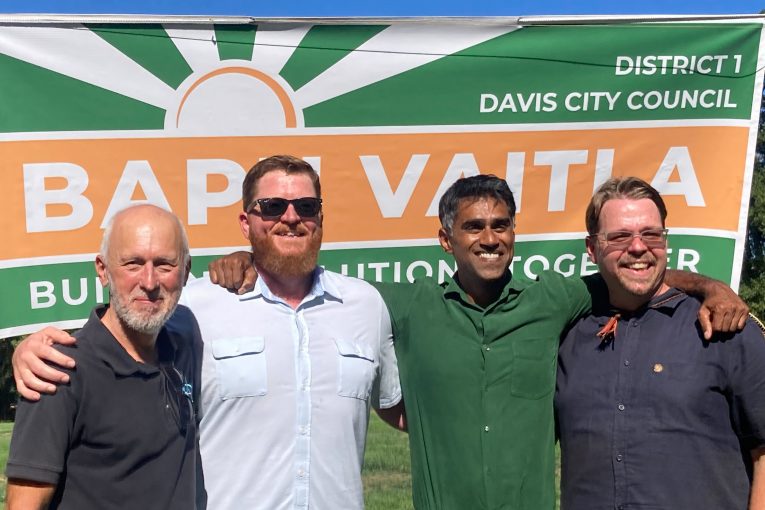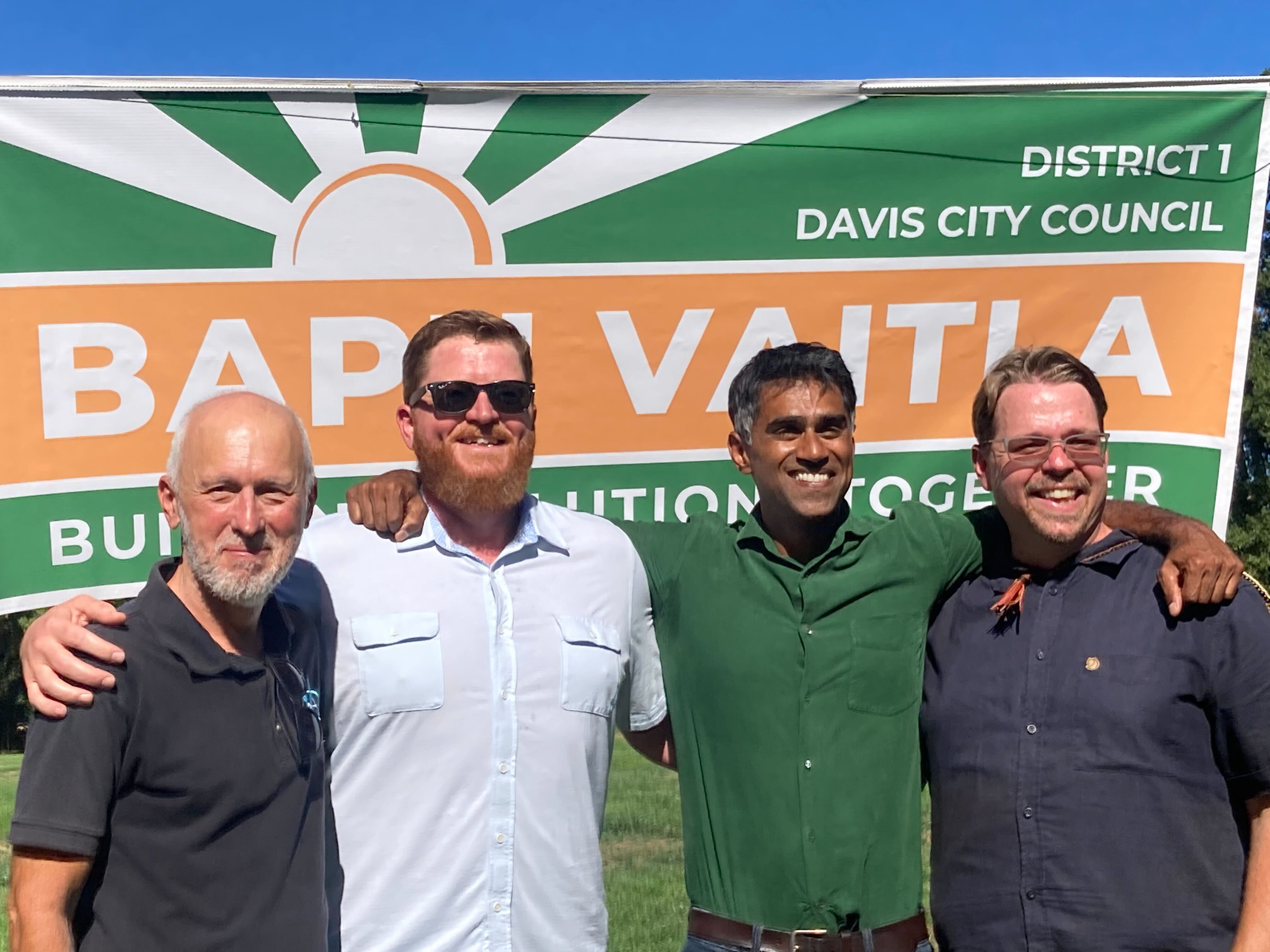

By Bapu Vaitla
(Editor’s note: this is the text of the speech given by Bapu Vaitla on Saturday at Village Homes. The Vanguard will publish speeches and op-ed’s from any of the candidates or on behalf of any of the candidates).
Thank you everyone for coming out today! Your support means a lot to me. I want to talk for a few minutes about what this campaign’s about, who I am, and what all of us can do together in service to social and environmental justice in Davis.
When we see what’s happening globally, what’s happening nationally, it’s hard not to feel despair and cynicism. It’s been an exhausting past few years. Racial injustice, the devastation of climate change, the toll of the pandemic…it can all feel so overwhelming at times. But my hope for everyone here, my hope for myself, is that in the middle of all this darkness we can also see what an extraordinary thing it is to wake up everyday and keep trying. To rest when we need to, and then to rise and take another look at this magical planet, to take a look again at the faces of our loved ones. To see again the hope and faith of children and keep living, keep trying. To endure. Perhaps even to  endure with joy.
endure with joy.
I’m running for public office because I still believe in the world we all dream of, the world where every person, regardless of gender, race, income, has the opportunity to be healthy, to be their best, most creative self, to be loved. I still believe that, as bleak as the environmental crisis appears, a world in which human beings are wise stewards of the land, the air, the water, the soil, on which all species have a right to exist, is possible. And more than possible: I believe that world is right around the corner. I feel it. As hard as things seem, I feel it. I feel hope.
And I’m running for public office because I believe that local action is at the heart of how that change happens, how we turn hope into results. Cities all over the world are leading innovation in climate policy, in social justice—cities are showing the world that fossil fuel-free economies are possible, that building housing for all is possible. We can learn from those examples, and we ourselves can be an example. That’s how good change happens—not only through the top-down actions of political or economic elites, but by communities putting in the hard work, learning how to trust each other, finding ways to cooperate, taking hits and helping each other back up.
I want to tell you why I care about all of this. I was born in India and moved here when I was four. I grew up in a working class neighborhood of Chicago and a highly segregated area of Los Angeles—my family wasn’t destitute, but we were low-income and depended on public benefits from time to time. I know how hard life can be for families who don’t know if they’ll have enough money to pay the rent on the first of the month, who have to be very selective about what food they buy for their kids, who have to judge whether to take a sick child to the hospital, knowing the bill is going to be overwhelming. And I know what it’s like to be a child, a teenager, who feels the shame of all that, who feels poor and different, not quite good enough to be worthy of love, of attention, of equality.
It was coming to Davis for my bachelor’s degree that changed all that. Here, in this town, I found community, people who let me be whatever I wanted to be, who helped me let go of shame, who pushed me to express the best parts of myself, who helped me endure. And I found a connection to the land too; I fell in love with the Putah Creek watershed, the valley oaks, the willows, the grassland that still survives here and there. *
I studied environmental ethics and then stayed here for my master’s degree, studying sustainable agriculture and rural poverty. Davis changed me and it equipped me. I went abroad for nearly a decade, working for non-profits fighting against hunger, especially among infants and young children, and especially in India, Ethiopia, and Brazil. I came back to the US to do my PhD on the politics and economics of child malnutrition, and later post-doctoral work on the intersections between hunger and climate change.
And then I moved back to Davis. I moved back to Davis because wherever I went in the world, I saw that the people who made the most difference, those who genuinely advanced social and environmental justice, were those who were committed to their home, the ones that were always going to ride with their community no matter how hard the challenges. I came back to Davis because it’s the only place that’s ever really been home. This is the place—and you are the people—that took me in, and this the place that I want to serve.
And I’ve done my best to serve. As Chair of the Social Services Commission, I helped lead the City’s groundbreaking public safety reform process and continue to fight for affordable housing for our workforce, low-income families, and the unhoused. I also serve on the Board of Cool Davis, our community’s leading organization focused on climate resilience and carbon emissions reduction. I work with researchers at the University to support County programs that provide a guaranteed income to families that were homeless. I balance all of this with my day job at the United Nations Foundation, where I work for gender equality, for the social, economic, and political rights of women and girls in countries across the world.
The most powerful lesson I’ve learned throughout these experiences, here in Davis and across the world, is that each person’s well-being is intertwined with the well-being of every other person—and in fact with the well-being of other species, of the natural world. What becomes of other people, what becomes of the soil and the creatures in the soil, of the trees and air and water, is what will become of us.
*Interdependence is the truth of the world, and the world becomes better when we create ways by which we can work together for the common good—to act as if we believed, down to our bones, that we are all one body. That is my highest aspiration for public office.
Examples of this kind of wisdom and commitment are all around us. There is an incredibly hard-working network of people in Davis who are fighting for the rights of the unhoused, to make shelter a fundamental human right in our community. There are people who have devoted their days to clean energy and climate resilience.
There are people supporting those with mental illness, substance use problems; there are those working for reform of our criminal justice system, for LGBTQ rights, working to support our elderly and our children. There are all of you raising and teaching children, which is the hardest and most important job on the planet. All of this work is an affirmation of our interdependence.
And I’m ready to play my role. I’m running to ensure housing for all: that everyone in our community—our workers, our teachers and firefighters, our students, our unhoused—has a decent, affordable place to live. I’m running on climate action: to keep pushing our City’s energy and housing and transportation systems to be models of what’s possible. I’m running on community cooperation: to create ways for everyone to participate in civic life that feel meaningful and fun, that we push local democracy to reach its fullest, most innovative potential.
Many of these reforms don’t require additional funds at all, but rather strategic vision, leadership, and community mobilization. Other changes do require financing, and I’ve got detailed plans for how to pay for them. I’m happy to talk to anyone here about those specifics.
But what I want to emphasize in this moment, the one thing I want you to remember about my words here today, is that the world, the city, we dream of is possible if we stay together—if we build a movement that allows every person’s strengths to shine, a movement that supports those who need to rest and grants energy to those are ready to work. The author James Baldwin, one of the finest minds and finest hearts this country has ever known, once wrote: “The sea rises, the light fails, lovers cling to each other, children cling to us. The moment we cease to hold each other, the moment we break faith with one another, the sea engulfs us and the light goes out.”
He wrote those words 60 years ago, and they’re even more literally true now. The sea is rising: these are the stakes. And on the other side of that warning is hope. The rewards of staying together, holding each other. An individual campaign can bring a dose of hope; but a movement of people who stay together, who take the hits and get back up, who are committed to self-reflection and love of others—the simple ideal of love—can change the world, can make what seemed impossible yesterday seem inevitable today. Thank you for being here! Let’s do this, and let’s do this together.
